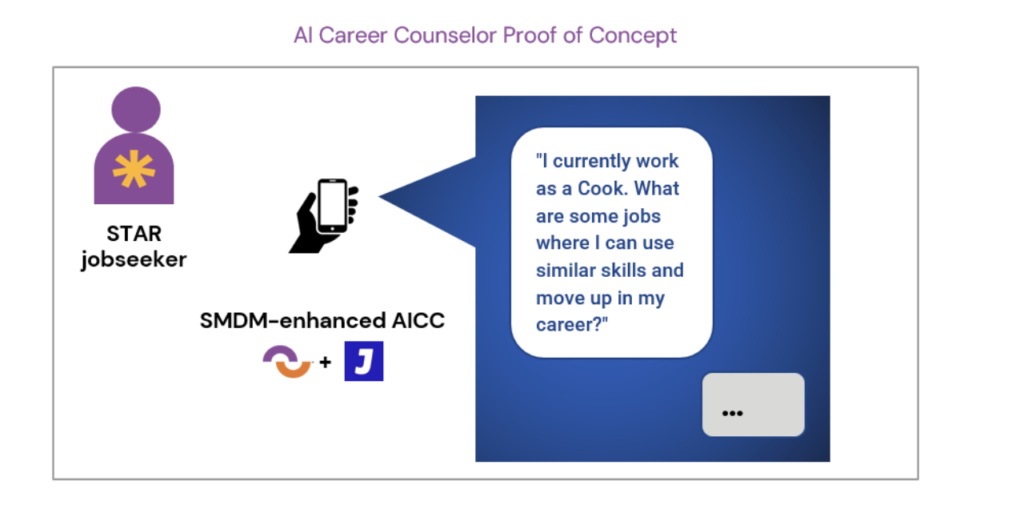Unlocking New Opportunities for Learners and Earners Through Data Integration with Opportunity@Work
Three organizations raised their hands to pressure test the Learner Information Framework tools and model produced by a collaborative effort of 27 contributors in their own environments.
Hear from Natalia Lara with Opportunity@Work (O@W)
In August, we heard about WGU’s effort, and today, we are pleased to pass the pen to Natalia Lara with Opportunity@Work (O@W) to share their plans for their Learner Information Framework (LIF) demonstration project.
Natalia is the Director of Product Design, STARs Inclusion Mode at Opportunity@Work, where she manages multiple initiatives aimed at helping “STARs” – people who have gained skills through alternative routes rather than a traditional college education. The goal of these projects aims to create and test solutions that drive better outcomes for STARs who want to switch careers or increase their income.
What is O@W testing with their LIF demonstration project?
O@W is testing whether the LIF data tools can be used to take large amounts of external data and quickly incorporate it into O@W’s STARs Mobility Data Model, which combines several trusted data sources to inform skills-based hiring strategies.
Our hope is that bringing together this data—which has previously not been connected nor used due to proprietary issues—would have positive outcomes for individual jobseekers and, if replicated with other partners, provide insights on key labor trends.
- For individual jobseekers, this project will provide us with information to better support individuals who want to change industries and those who want to boost their earnings potential. This project will help us gather and analyze information about individuals as they seek career guidance to upskill or navigate career changes, including what they want to achieve and what challenges they face.
- The end result for the overall education and job market systems is that we’ll be able to generate better insights for the entire educational and workforce ecosystem. For example, we might be able to identify more effective career paths for different types of learners, spot emerging job market trends more quickly, or develop more personalized career recommendations and support programs to address existing barriers to upward mobility.
Why is this needed?
Opportunity@Work (O@W) works to eliminate barriers to meaningful, higher-wage employment for STARs. STARs have acquired skills through community colleges, military service, or on-the-job training rather than a bachelor’s degree.
Our research shows that people with four-year college degrees typically have more opportunities to change careers, even when those changes require learning new skills. We want to find ways to help STARs have the same chances to make big career moves. Our goal is to discover what works best to support STARs in changing careers and to improve their job opportunities and financial situation.
How is O@W approaching the project? And how does LIF fit in?
We are taking the following steps:

- Partner with Jobcase, a leading technology and AI company that provides a talent marketplace and social platform for jobseekers, to bring in a large amount of new data, leveraging the LIF tools so that the process can be easily replicated. Within Jobcase’s data systems, this data includes anonymous user data such as work and education history, demographics, as well as conversation logs between their members and Jobcase’s AI Career Counselor as they seek support in their career navigation.
- Leverage the new LIF data tools. LIF’s Translator and Orchestrator tools take data in its original form—from proprietary systems or common standards—and transform it into a consistent, normalized format. This method creates a common language for diverse data sources, offering two compelling advantages: it preserves crucial detailed information often lost in conventional conversions and enables organizations to build complete historical views by connecting data across multiple systems.
- Test Jobcase’s new AI Career Counselor, enhanced by our existing data model, with learners. LIF provides a compelling integration with AI tools like the Career Counselor. We can capture unstructured data from counselor chat logs, filter it based on desired attributes in our systems, and organize it for easy access and querying by our data analysts. The AI Career Counselor will help learners who aim to boost their earning potential and explore career paths aligned with their skills and background by providing insights throughout their journey, including tracking personal reflections, skills, experience, goals, and challenges. The LIF data model is designed to organize these attributes, adding a new level of granularity that enhances our existing data model.
- Learn from and share our results. We will then capture learner longitudinal information, produce case studies, and disseminate early insights about the career counselors’ role and LIF’s implementation outcomes. Additionally, by joining the LIF community, O@W will learn from and with the other demonstration sites. We want to use the insights from these tools to help both individual users and the broader job market, and encourage more institutions to develop data partnerships that can broadly enhance our data insights to catalyze innovation that better serves STARs – individuals Skilled Through Alternative Routes rather than a Bachelor’s degree.
We believe this research and development project will test key data usage and sharing challenges. By joining the LIF community, Opportunity@Work is excited to learn with other demonstration project teams, apply theory to practice, and take a diverse approach to addressing data problems. We hope this effort leads to drastic shifts that ultimately serve skilled workers through alternative routes to improve their economic mobility.